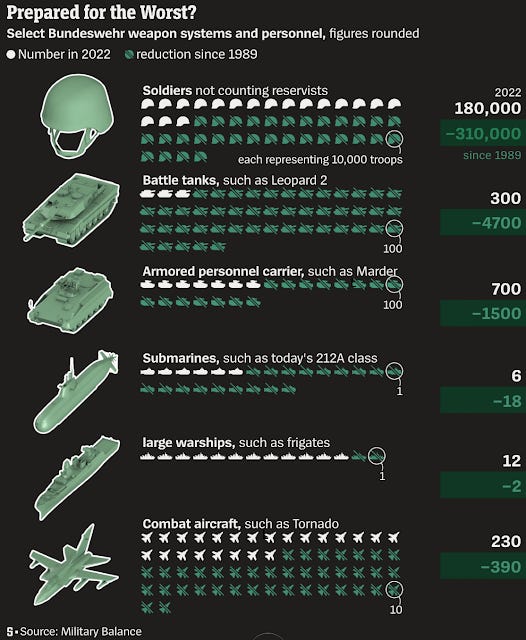Complacency, a self-serving bureaucracy, and a willful forgetfulness of the fundamentals of war is a common thread in most 21st Century defense establishments in the developed world, but these very human conditions are worse in some nations than others.
Germany stands out.
If you want a sobering view of the military situation of our German allies, Der Spiegel has a staggering report that provides a stark view of what small budgets, ill-fitting reforms, and just plain anti-military politicians can do to a nation who is - whether they want it or not - a keystone to NATO's continental defense.
Though it isn't quite fair to use the end of the cold war force levels - everyone's graphs would look nasty with that benchmark - but it is helpful to look at what was in living memory back when your host 'ole Sal was a JO;
Coming to 2023 and recent history, well, what the German political elite did makes what we've done to the American military look like art;
According to a forecast by the German Economic Institute, Germany will fall 10 billion euros short of the 2-percent target by 2026 – and by just short of 40 billion euros the following year.
And it’s not even certain that NATO’s defense spending target will remain at 2 percent. Given the Russian threat, some Eastern European member states are insisting that alliance members raise defense spending to 3 percent of their gross domestic product.
There are a number of indications that NATO is planning this year to turn the 2-percent mark from a target to a minimum. Germany, which sees itself as a leader on security policy, would find itself in a position of having to prove its intent by adequately funding its military.
A boost to the Defense Ministry budget would only be politically palatable, however, if it can be guaranteed that the extra billions for the Bundeswehr would not simply trickle away like water in the desert. And for that, the military would have to be fundamentally reformed, a project that Minister Christine Lambrecht has shown no interest in – even if she bears little responsibility for the predicament in which the Bundeswehr currently finds itself.
This should sound familiar;
The grain-size for sand in shooting ranges is specified, for example, while limits for the exposure to gunshot gas in the combat compartment of infantry fighting vehicles are bickered over so that the threat of "amniotic fluid damage to the female Puma crew" can be strictly ruled out.
Regulators require that gangways on new warships must be as wide as those on civilian ships. Now, you can walk past each other with "two walkers without any problems," as one naval officer scoffs. Meanwhile, though, the Bundeswehr is no more combat ready than it used to be. On the contrary.
The armed forces have lost their core competence over the years as they have become completely bureaucratized: combat. Within the administration, combat isn't even a relevant category – except, that is, when it comes to dealing with the next closest department.
The administration thinks in terms of processes, not results. The most important thing is that decisions be made in accordance with the rules. Every civil servant knows that mistakes can slow down a career and that a project well done doesn't necessarily guarantee further advancement. Instead, risks are eliminated to the degree possible. And time plays no role in the equation.
This combination of regulatory frenzy coupled with risk aversion is stifling the Bundeswehr. Systematically, responsibility has been shifted from the bottom up to anonymous large-scale authorities. In the past, it was up to a battalion to decide who would be promoted to lance corporal. Today it is the Personnel Office of the Bundeswehr that makes that decision.
Are any nations doing this well, or are we all just different degrees of bad?
The German military is in many ways is subject to a distilled version of the challenges the US military has. Large budgets can hide a lot of problems from bad leaderships and worse ideas. Shrink that budget down, and you get a concentrated soup of bad.
The present German government is led by the SDP, a party that simply is not institutionally capable in 2023 of being a serious leader of a serious military.
Until there is fundamental change at the top where the desires of the German people align with the desires of their NATO allies, then we will have to continue to find work arounds. In the long run, the experience of the last year will set back Germany a few decades from her taking her position on the continent where she belongs. An opportunity for Poland and France, if they want it.





"The administration thinks in terms of processes, not results."
This is the core pillar of American governance.
The other pillars are greed and malice oblige.
Germany is not a nation in the terms you discuss, they are a territory of the American Empire and are treated accordingly. The SDP doesn't have to be serious, it has to obey: and_follow_the_process.
Their NATO allies blew up Germany's energy pipelines. They have paid the price for being the industrial center of Europe without a Reich military to protect them.